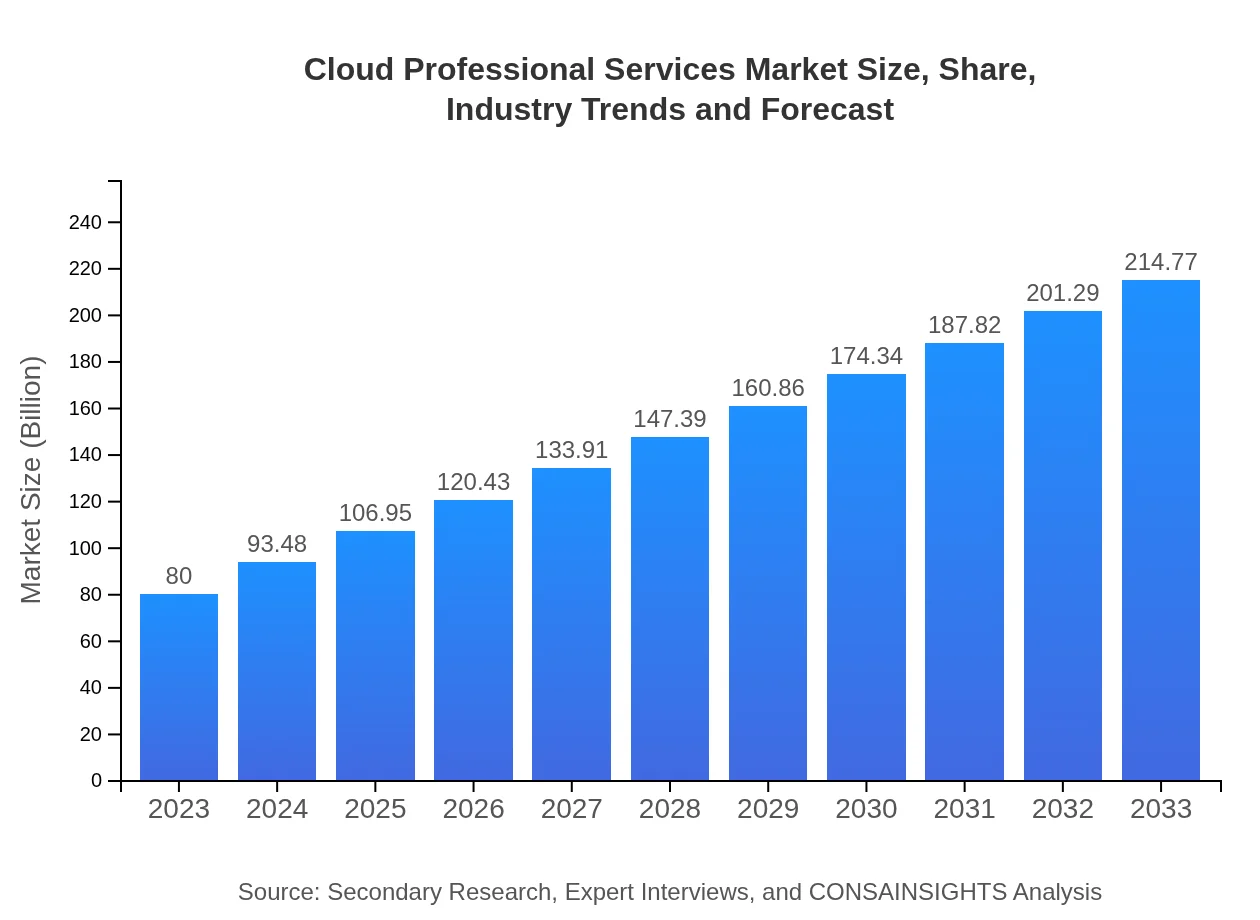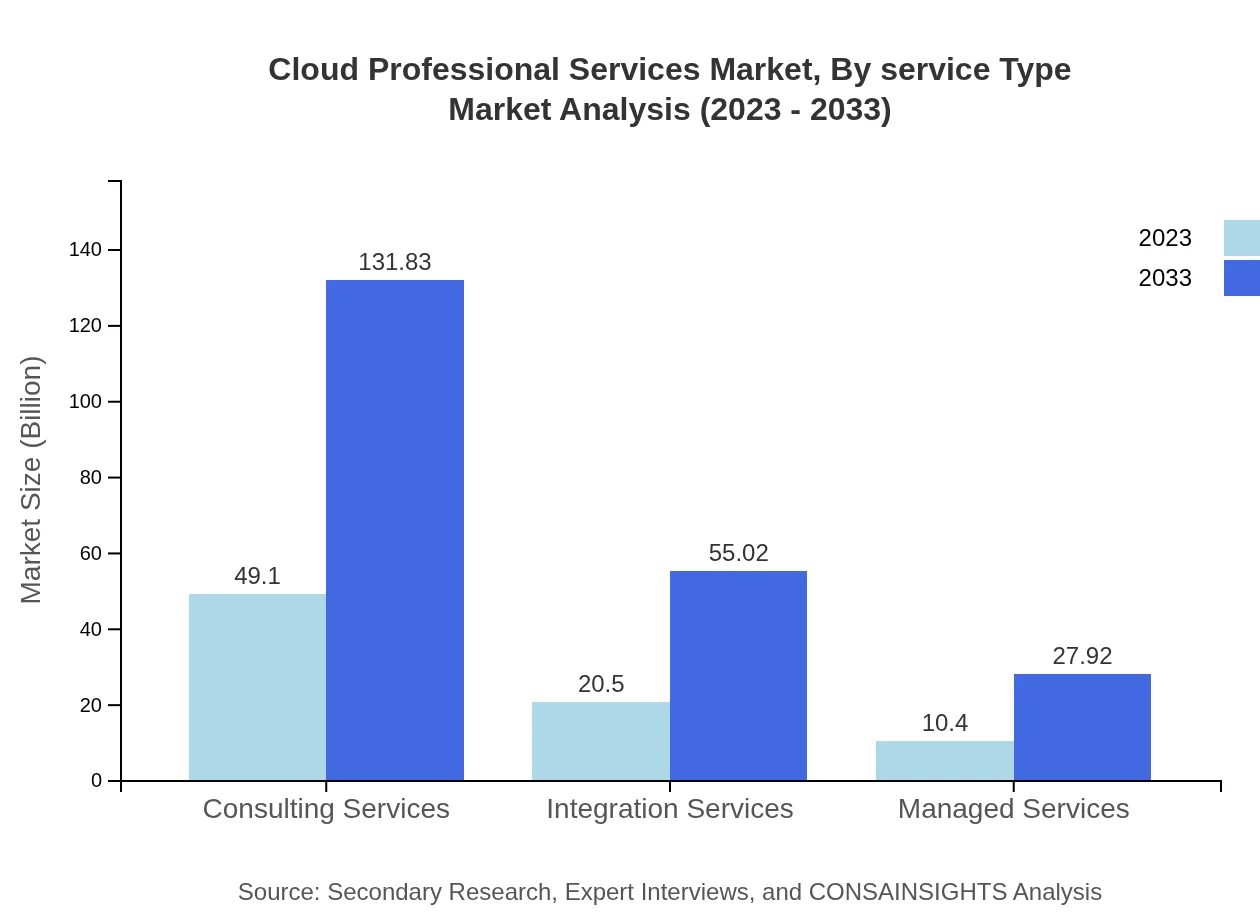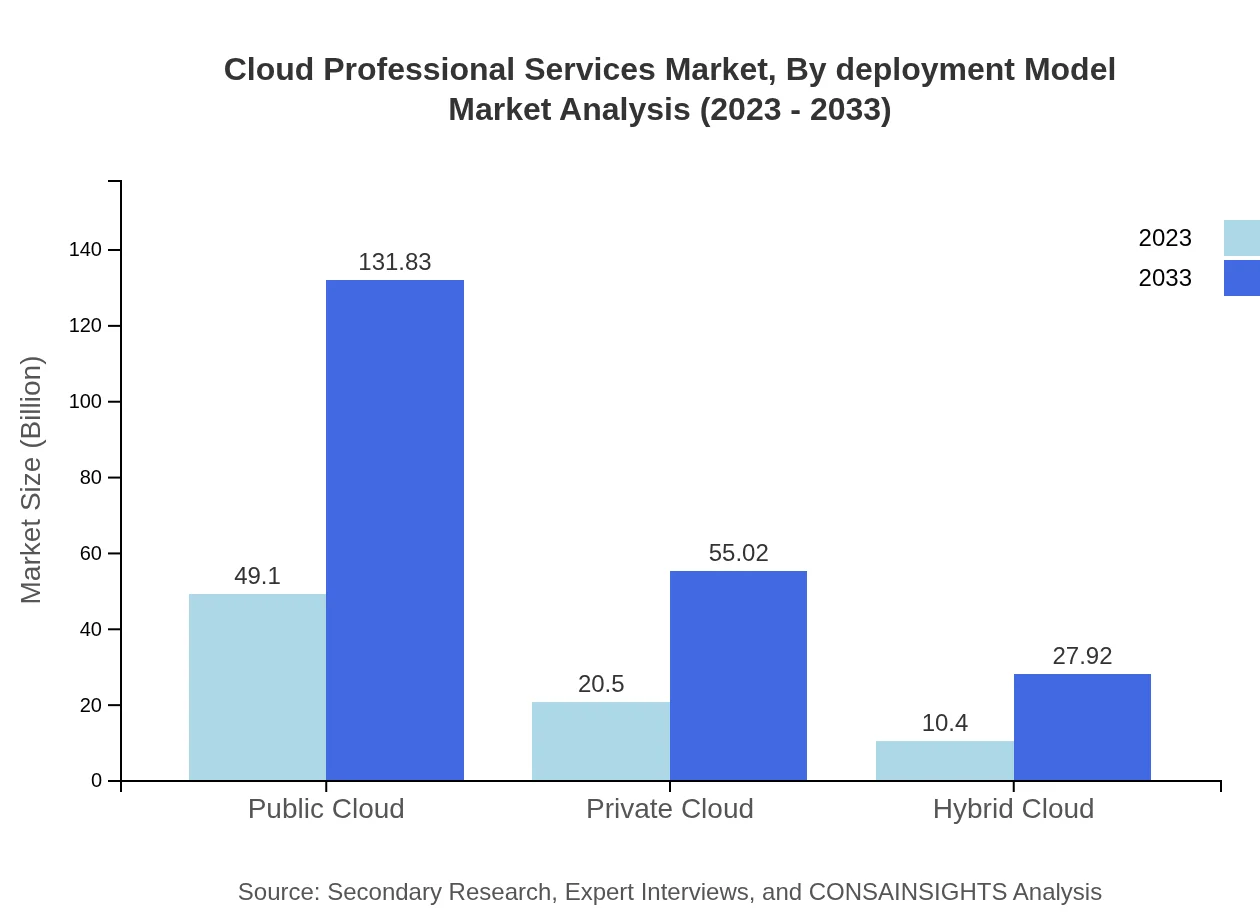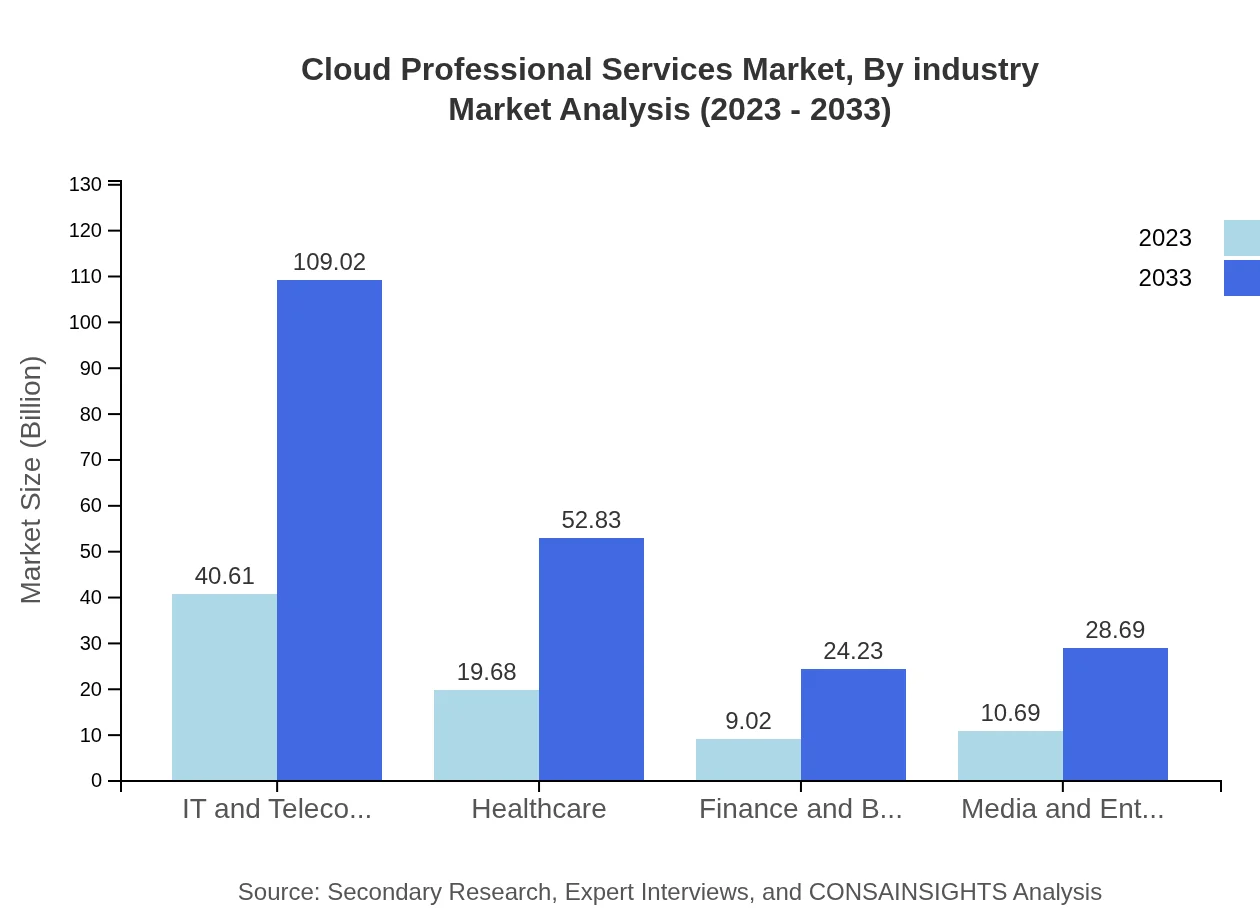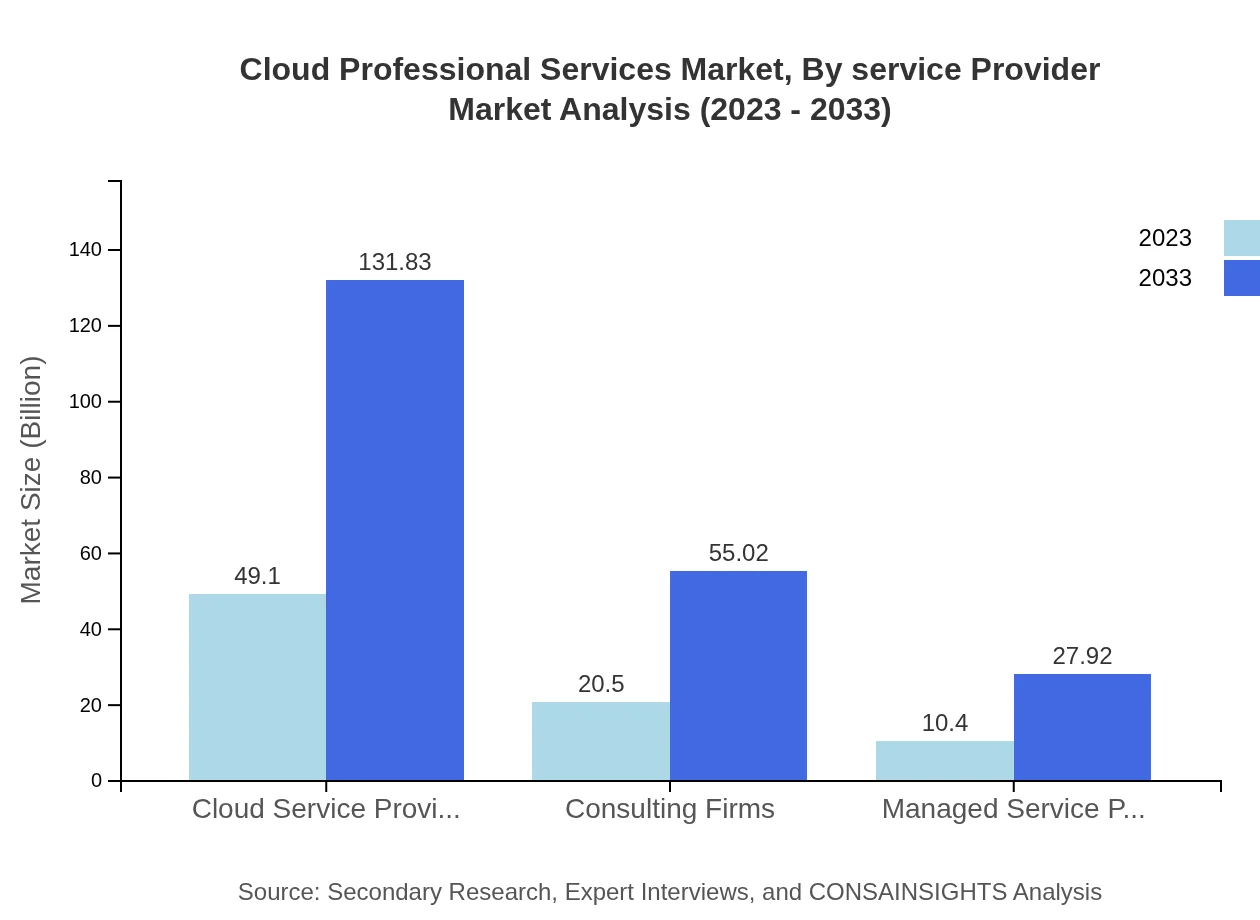Cloud Professional Services Market Report
Published Date: 31 January 2026 | Report Code: cloud-professional-services
Cloud Professional Services Market Size, Share, Industry Trends and Forecast to 2033
This report provides a comprehensive analysis of the Cloud Professional Services sector, focusing on market size, trends, and forecasts from 2023 to 2033, offering valuable insights into growth drivers and market challenges.
| Metric | Value |
|---|---|
| Study Period | 2023 - 2033 |
| 2023 Market Size | $80.00 Billion |
| CAGR (2023-2033) | 10% |
| 2033 Market Size | $214.77 Billion |
| Top Companies | Amazon Web Services (AWS), Microsoft Azure, IBM, Google Cloud, Accenture |
| Last Modified Date | 31 January 2026 |
Cloud Professional Services Market Overview
Customize Cloud Professional Services Market Report market research report
- ✔ Get in-depth analysis of Cloud Professional Services market size, growth, and forecasts.
- ✔ Understand Cloud Professional Services's regional dynamics and industry-specific trends.
- ✔ Identify potential applications, end-user demand, and growth segments in Cloud Professional Services
What is the Market Size & CAGR of Cloud Professional Services market in 2023?
Cloud Professional Services Industry Analysis
Cloud Professional Services Market Segmentation and Scope
Tell us your focus area and get a customized research report.
Cloud Professional Services Market Analysis Report by Region
Europe Cloud Professional Services Market Report:
The European market for Cloud Professional Services is set to expand from $23.52 billion in 2023 to $63.14 billion by 2033. The region is witnessing a substantial shift towards smart technology and data-driven decision-making, contributing to rising demand for cloud solutions that ensure compliance with data regulations and enhance collaborative efforts across businesses.Asia Pacific Cloud Professional Services Market Report:
The Asia Pacific region is projected to experience significant growth, with the market size expected to rise from $17.13 billion in 2023 to $45.98 billion by 2033. This growth is fueled by increased digitalization and cloud adoption among emerging economies in the region. Countries like India, China, and Australia are leading the charge, driven by government initiatives and expanding IT infrastructure.North America Cloud Professional Services Market Report:
North America remains the largest market, with a projected increase from $26.36 billion in 2023 to $70.77 billion by 2033. The presence of major cloud service providers and a highly developed IT infrastructure contribute to this growth, alongside companies' ongoing efforts to optimize their digital operations.South America Cloud Professional Services Market Report:
In South America, the Cloud Professional Services market is anticipated to grow from $6.94 billion in 2023 to $18.62 billion in 2033. Factors such as economic recovery, increasing mobile penetration, and investment in digital transformation initiatives are propelling the demand for cloud services across various sectors.Middle East & Africa Cloud Professional Services Market Report:
The Middle East and Africa are expected to see growth from $6.06 billion in 2023 to $16.26 billion by 2033, driven by increasing cloud penetration and investments in IT infrastructure. As countries in this region enhance digital capacities and cloud adoption, there is a growing need for professional services that assist organizations in leveraging technology for business transformation.Tell us your focus area and get a customized research report.
Cloud Professional Services Market Analysis By Service Type
By service type, consulting services dominate the market, expected to grow from $49.10 billion in 2023 to $131.83 billion in 2033, maintaining a share of 61.38%. Integration services, vital for seamless cloud adoption, grow from $20.50 billion to $55.02 billion, while managed services show a strong increase from $10.40 billion to $27.92 billion.
Cloud Professional Services Market Analysis By Deployment Model
The adoption of public cloud services is notably robust, projected to expand from $49.10 billion in 2023 to $131.83 billion by 2033. Private and hybrid models are also experiencing growth, with private cloud services increasing from $20.50 billion to $55.02 billion, driven by security and compliance needs.
Cloud Professional Services Market Analysis By Industry
The healthcare sector is rapidly adopting cloud solutions, with its market share anticipated to grow from $19.68 billion in 2023 to $52.83 billion by 2033. Other significant industries include finance and banking, which will expand from $9.02 billion to $24.23 billion, reflecting the trend toward digital transformation.
Cloud Professional Services Market Analysis By Service Provider
Cloud Service Providers lead this market segment, as organizations seek efficient service delivery models and faster cloud adoption. This segment grows from $49.10 billion in 2023 to $131.83 billion in 2033, with Consulting Firms also gaining traction, rising from $20.50 billion to $55.02 billion.
Cloud Professional Services Market Trends and Future Forecast
Tell us your focus area and get a customized research report.
Global Market Leaders and Top Companies in Cloud Professional Services Industry
Amazon Web Services (AWS):
As a pioneer in cloud computing, AWS offers a wide range of cloud services, including consulting and managed services, making it a leader in the Cloud Professional Services sector.Microsoft Azure:
Microsoft Azure has established itself as a formidable player in the cloud space, providing an extensive portfolio of cloud services and solutions for businesses across industries.IBM:
IBM has been a key player in the cloud professional services market, driving innovation through its consulting and integration services tailored for large enterprises.Google Cloud:
Google Cloud focuses on leveraging AI and machine learning within its services, positioning itself as a leader in innovation in the Cloud Professional Services sector.Accenture:
Accenture provides comprehensive cloud consulting services, empowering organizations to transform their operations and adopt cloud technologies effectively.We're grateful to work with incredible clients.









FAQs
What is the market size of cloud Professional Services?
The cloud professional services market is projected to reach approximately $80 billion by 2033, with a notable CAGR of 10%. This growth indicates a robust demand for cloud solutions across various sectors, reflecting the ongoing digital transformation.
What are the key market players or companies in this cloud Professional Services industry?
Key players in the cloud professional services industry include major consulting firms, cloud service providers, and technology integrators. Companies such as IBM, Accenture, AWS, and Microsoft lead the market, offering comprehensive solutions and expertise.
What are the primary factors driving the growth in the cloud Professional Services industry?
The growth of the cloud professional services industry is driven by increasing digital transformation, the demand for seamless IT infrastructure, and businesses seeking to enhance operational efficiency. Additionally, the ongoing shift toward remote work fuels the demand for cloud-based solutions.
Which region is the fastest Growing in the cloud Professional Services?
Asia Pacific is the fastest-growing region in the cloud professional services market, with expected growth from $17.13 billion in 2023 to $45.98 billion by 2033. This growth is fueled by rapid technological adoption and increasing cloud initiatives in emerging economies.
Does ConsaInsights provide customized market report data for the cloud Professional Services industry?
Yes, ConsaInsights offers customized market reports tailored to client requirements in the cloud professional services industry. This includes detailed analysis and forecasts that cater to specific business needs and strategic goals.
What deliverables can I expect from this cloud Professional Services market research project?
Deliverables from the cloud professional services market research project include comprehensive market analysis, trend identification, competitive landscape overview, regional insights, and customized strategic recommendations based on our findings.
What are the market trends of cloud Professional Services?
Key market trends in the cloud professional services sector include a shift towards hybrid cloud solutions, increased focus on security, and the proliferation of AI and machine learning applications. These trends reflect the evolving demands and challenges organizations face in a cloud-driven landscape.

